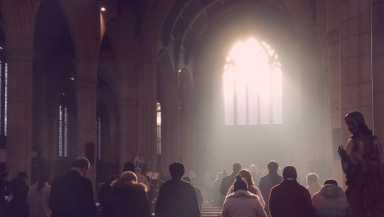
The Church of England's bishops emerge from last week's meeting of the General Synod with their power significantly diminished.
The slew of safeguarding scandals that has hit the Church in recent months has certainly weakened the moral authority of bishops.
Archbishop of York, Stephen Cottrell, now the C of E's interim leader after the resignation last November of Archbishop of Canterbury, Justin Welby, in the fall-out from the Makin Review into John Smyth's abuses, has faced calls for his own resignation.
An online petition signed by over 37,000 people calls on him to resign "over his shameful inaction over several years to safeguard the victims of abuse by disgraced ex-priest David Tudor" when he was Bishop of Chelmsford. He has also come under pressure over his handling of allegations of sexual harassment against the former Bishop of Liverpool, John Perumbalath, who announced his retirement on January 30, denying the allegations against him.
On the first day of General Synod at Church House, Westminster, meeting for its February 2025 group of sessions, Archbishop Cottrell suffered the humiliation of 73 members voting to bypass his presidential address and move onto next business with 43 abstentions. A majority voted to hear him so he got the platform but it was a visibly shocked Archbishop Cottrell who got up to speak.
None of these developments, however, has dented the actual power of any archbishop or bishop over their licensed clergy.
What has affected episcopal power is the new Clergy Conduct Measure (CCM), which General Synod approved on February 12. The CCM replaces the Clergy Discipline Measure (CDM), which the then House of Bishops got through Synod in 2003. This hugely altered the balance of power between bishops and clergy.
Under the CDM a parishioner or anyone deemed to have an interest could lodge a complaint against a frontline clergyperson simply by filling in a form and sending it to the relevant diocesan bishop.
The bishop would then pass on the complaint to the diocesan lawyer, the Registrar, who examined it and advised the bishop. As adjudicator, the bishop could dismiss the complaint as falling below the level of clerical misconduct or deal with it formally as an allegation of misconduct.
Clergy facing misconduct allegations needed to hire lawyers and apply for Ecclesiastical Legal Aid which might not cover all their costs.
As grassroots momentum gathered to get rid of the CDM, the Church Times ran an article in 2018 headlined "Clergy Discipline Measure: a harsh discipline?". It stated: "The CDM put the bishop in a central position - prompting one priest to ask 'Are they to wear the mitre or the wig?' - and created a bishop's disciplinary tribunal, designed to be more in line with other professions, to hear cases."
It is easy to see why under the CDM regime some episcopal egos inflated somewhat. It is also easy to see why the power shift enabled bishops so inclined to become managerial as they sought to cut clergy numbers and merge parishes in their cash-strapped dioceses.
As the C of E press release announced on the day Synod approved the CDM's replacement: "The new measure is designed to provide a clearer, more proportionate, and pastoral approach to clergy discipline, in response to concerns about the shortcomings of the existing system.
"For over two decades, the CDM has provided the legal framework for handling serious complaints against clergy. However, it has been criticised for being overly legalistic, slow, and burdensome for both complainants and clergy.
"Originally designed to address serious misconduct, Synod heard that it had become a catch-all process for all complaints, often leading to undue stress and reputational damage for clergy facing minor grievances."
Under the new CCM, "grievances will now be addressed locally through informal resolution, ensuring that minor issues do not escalate unnecessarily.
"Cases of misconduct will be investigated by a case assessor, with bishops imposing penalties where appropriate, while the most serious cases will be handled centrally by an independent Investigation and Tribunals Team."
Whether the new disciplinary regime will boost the pastoral care and support frontline clergy are receiving from their bishops is open to question. Surely that is down to the Christian character of their bishop?
If he or she was already a power-playing careerist, then under the new CCM they would turn into a frustrated one because their power has been reduced. If they were already a servant-hearted Christian, they would have been looking after their clergy anyway.
The power shift away from bishops under the CCM will probably boost frontline clergy morale as they get more protection from vexatious complaints. But unfortunately the more benign disciplinary regime cannot remove the spiritual crisis facing the Church amidst the deep divisions over same-sex blessings or the financial crises dioceses are facing due to numerical melt-down.
Julian Mann is a former Church of England vicar, now an evangelical journalist based in Lancashire.













